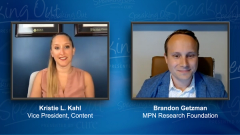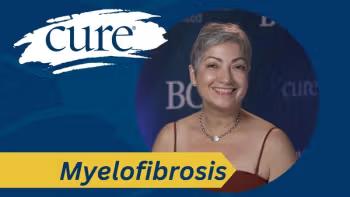
Helping Patients With MPNs to Elevate Their Voice
CURE spoke with Brandon Goetzman, board member from the MPN Research Foundation, on elevating the patient’s voice when it comes to their care for myeloproliferative neoplasms.
Kristie L. Kahl: Why is it important to help elevate the patient's voice when it comes to MPNs specifically?
Brandon Goetzman: Yeah, so, we believe there's 300,000 MPN patients in the United States, and at least that in Europe, and so when you, when you think about the prevalence of this disease, just in those two regions of the world, there's, there's literally millions of MPN patients around the globe. And, you know, unfortunately, there's probably a number of patients that that are yet to be diagnosed. And it's one of these diseases that you can live with, for a long time, you may not even know that you have it. And when you do get diagnosed with it, it can result in obviously a major change to your outlook on life. And so we at the MPN Research Foundation are very focused on investing dollars in research funding. And we think that that is the best way for us to impact and change the prognosis for patients and their families. And so, one of the things about MPN, that makes it I think relatively unique is just the sheer complexity of the diseases. And you know, we have three different MPNs. ET, (or) essential thrombocythemia, polycythemia vera (or) PV, and myelofibrosis (or) MF, and we have three known driver mutations. And those driver mutations can cause a number of different diseases. And you know, each of those driver mutations can cause myelofibrosis, one of them can cause PV, all three of them can cause ET. And so it's a very complex disease. And it's really important for patients to be to have the knowledge of these diseases. And that is what we really focus on at the MPN Research Foundation is helping patients understand these diseases, and then focus on getting the best care that they can, and ultimately pushing the science forward to help them have a better overall outcome.
Kristie L. Kahl: Why is it important that we make sure patient's goals for their treatment are taken into consideration when they are discussing their treatment options with their physician?
Brandon Goetzman: Yeah, so, you know, there are there are a few drugs that we've been using for for decades to treat MPNs. And we're hopeful at the foundation, and I think clinicians alike, that there's going to be a number of new drugs that could come to receive FDA approval in the coming years. And so we're, you know, we live in a hopeful time For MPN patients. That said, you know, the, the, the treatment decisions are not perfect today. And they're actually gaining complexity over time, as new drugs reach FDA approval. And these are these are good problems to have. However, the decisions again become more complex about when should a patient start treatment, which drugs should they start on, you know, are there combination therapies that they should be using with what with what disease that they have. And these are tough decisions to make alone. And we always recommend that MPN patients go and see an MPN specialist, because the MPN specialists tend to be the ones that are most up to date on current therapy, therapy choices, which drugs are best suited for a given patient's situation. And given the complexity of these diseases, and the potential for, you know, certain driver mutations and secondary mutations to be involved, I think it's just all the more important for MPN specialists to be involved in these care decisions. What we know, for sure, in general is that the longer a patient has the disease, the more likely they are to progress to a more severe form of the disease, for instance, ET or PV can lead to MF; ET, PV or MF could eventually lead to AML. And these are much more severe forms of an MPN. And unfortunately, do impact the prognosis for patients. And so, again, we think that focusing on the options and weighing those risk rewards of potential therapy choices with an MPN specialist is the best way for patients to you know, have the best outcome.
Kristie L. Kahl: How can we ensure that patients are involved in their treatment decisions?
Brandon Goetzman: Yeah, patients have to be their own advocate. And if they are, you know, less than maybe capable of doing, doing everything that they need to be their own advocate, I think it's important for a caregiver to be involved in going to appointments, setting up appointments with an MPN specialist, getting a second opinion, when it's when it's maybe necessary, I think, especially, you know, early in the diagnosis, it would be a good idea to have a second opinion from an MPN specialist. And then also about new therapy choices or changes in therapy choices. All of these things, I think are very important for the patient voice. And, you know, we all know that it's not always easy to go see an MPN specialist. If you live maybe in a smaller community, a smaller town community, you may have to travel to an academic center, which tend to be in major cities. But we do believe that that is well worth it in terms of making that trip. And a lot of these MPN specialists are willing to work with your local hematologist, if you're a patient, to help, you know, provide the best quality of care for you, even if you can't come and see the MPN specialist that may be farther away, you know, every, every, every few months as a follow up. And so, we would recommend patients take that that potential path if they can't see a MPN specialist regularly.
Kristie L. Kahl: How can patients become more educated, so that way they can become their own best advocate when it does come to their care?
Brandon Goetzman: Yeah, you know, it really goes to this cliche, which is knowledge is power. Right? You know, we do believe we live in a hopeful times for MPN research and potential for new MPN therapies to be coming to market. When the MPN Research Foundation was formed over 20 years ago, we didn't know why the disease happened. We didn't know what the three driver mutations were at the time. We also had very little in terms of therapy choices. And so these things have changed. We've made material discoveries in the last 20 years. We've seen new drugs come to market. One of the more recent approvals was a drug called Inrebic in 2019. And, you know, the more drugs that are approved, the more options patients have. But also the more complex the therapy choices are. And again, this goes back to MPN patients getting in front of an MPN specialist to to know what their full array of options are, and help, you know have that MPN specialist help them make the best choice for their given situation and every patient is different. Every patient has a different disease course. And that's why it's so important for patients to be you know, seeing a specialist that is most up to speed on current choices. And then, you know, I think it's also important to know that, especially for myelofibrosis patients where the only real cure is a stem cell transplant. And one of the one of the more tough decisions, I think, for patients with myelofibrosis is deciding when is the right time for me as a patient to move forward with a stem cell transplant and try to go for a curative result. And, you know, stem cell transplant is a very risky procedure today, we think that over time, that procedure becomes less and less risky, at least we hope that is the trend. But there's still a very tough, you know, weighing of risk reward involved in in making a decision to move forward with a stem cell transplant. And again, this is why, you know, having multiple perspectives on this, both from MPN specialists, maybe from a transplant specialist, is a way to help make that that tough decision. And then also, I think, you know, talking to other patients that have had to make those decisions, whether it's starting a new therapy or deciding to move forward with stem cell transplant, using or reaching out to the MPN network and finding other patients that that have been in similar situations can be empowering, and help patients make the best decision for themselves.
Kristie L. Kahl: And so, when it comes to quality of life in treatment, how does symptom management play a role with that and the patient's voice and voicing their value and quality of life?
Brandon Goetzman: Yeah, so, obviously, symptoms matter. We know patients care about it, it impacts their quality of life every single day. And some of these symptoms ... have a huge impact on their day to day from major fatigue to you know, large spleens and painful spleens. And so we absolutely believe symptoms matter. And a number of the approved drugs today help, you know, alleviate some of those symptoms. But that's not the whole picture, and what we're hopeful for at the MPN Research Foundation, is that there will be new drugs on the horizon and potential combination therapies on the horizon that can not only help with symptoms, which we do want to do, and we do want to see reduced for patients, but can these new therapies change the underlying disease in a meaningful enough way, where the disease is slowed, or materially modified, and the blood counts normalize. And then that suggests that we will also have symptom improvement as well, if you can do all of those things. It's sort of the Holy Grail, if you will, of MPN therapies. And, and, you know, again, we live in hopeful times that we think that these types of therapies could be on the horizon. And, you know, we're we remain hopeful for, for major advancements in the in the coming years. You know, the, the MPNRF has made several investments in understanding progression, which you know, is is maybe not necessarily thought of as a symptom of this disease. But as the disease progresses, patients tend to have more and more symptoms and they become more severe over time. So we really want to figure out a way to slow or stop progression for patients. It would be an amazing achievement for the entire MPN community, you know, academia and industry and patients alike, if we could figure out a way to prevent, you know, ET or PV from progressing to MF or prevent MF from progressing to AML. And so we've focused at the MPN Research Foundation on progression research, and trying to uncover new ways of understanding why the diseases progress in hopes of being able to eventually develop therapies that that could stop progression and allow patients to live healthier and longer lives.
Kristie L. Kahl: How can we raise more awareness around MPNs for patients?
Brandon Goetzman: Yeah, you know, the, the MPNRF’s tagline is change your prognosis. And we do believe you can do that. And we believe we are working towards that goal, that that mission every single day at the Foundation, and, you know, that can be anything from you know, helping raise money for research, to participating in a clinical trial, which if there were not patients participating in clinical trials, there would never be new drugs approved by the FDA. And so that is an incredibly important component of being an advocate for yourself, but also helping, you know, raise awareness for the disease and move the science forward so that it helps not only hopefully, the patients involved, but also future patients. We are a research-focused organization. And, and, and that's, that's how we believe that we will ultimately be able to change the prognosis of this disease. And that, you know, there's other ways of, you know, empowering patients, including, you know, becoming an advocate yourself, on behalf of yourself and other patients, you can reach out to other organizations that are in the MPN space that are focused on advocacy. And there's a number of these on the MPN Research Foundation website that you can see. And then there's also just understanding or keeping up to speed on the on the options that that are available to MPN patients. And that includes, you know, knowing what clinical trials are available, there's a link to the clinical trials in the MPN space on the MPNRFs website. And so again, you know, we do believe we live in very hopeful times for MPN patients, but there's a lot of work yet to be done. And until there's a cure, that is a fully safe and available cure for all MPN patients, you know, our missions not going to be done. And that, that that's both for our foundation, and also for clinicians and researchers and industry alike. And so, you know, again, a lot of work to do, to continue to help patients out and, and, and raise their voice.







